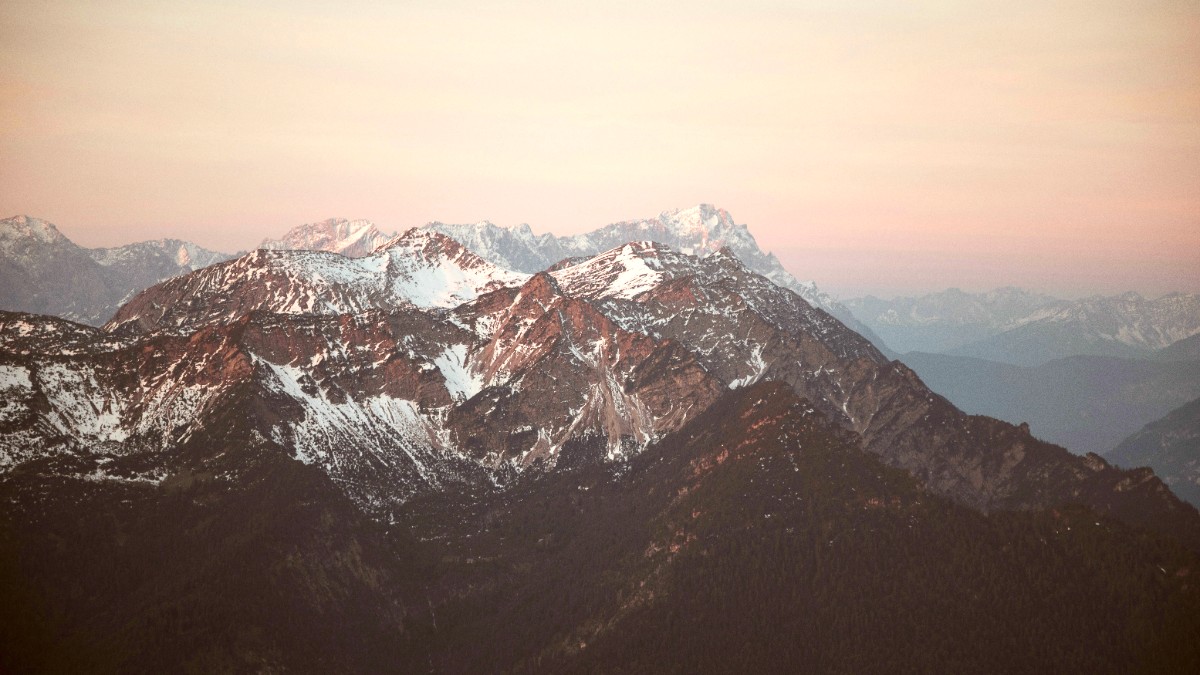
Bavarian Alps, Germany
Climate Patterns: Summer (June-August) temperatures range from 10°C to 25°C. Rain and afternoon thunderstorms occur. Autumn (September-November) sees temperatures of 5°C to 15°C, with potential for early snow at higher elevations. Winter (December-February) averages -5°C to 5°C with heavy snowfall. Spring (March-May) temperatures rise from 0°C to 15°C, with snowmelt and budding trees.
Humidity remains moderate to high throughout the year, with varying precipitation levels across seasons. Long daylight hours mark summer, while winter brings shorter days suited for snow activities.
Winter: Heavy snowfall and icy conditions are common. Appropriate footwear and gear are key. Avalanche warnings in high mountain areas, particularly after heavy snowfall. Check local warnings before venturing into uncontrolled terrain.
Summer: Afternoon thunderstorms occur frequently; rapid weather changes in the mountains are possible. Carry rain gear and check local weather forecasts before setting out on hikes.
December to March
Optimal snow conditions; atmosphere; all winter facilities open.
Highest prices; significant crowds; accommodation booking far in advance.
Mid-June to Early October
Most favorable weather; full trail access; beautiful landscapes.
Crowds on popular trails; afternoon thunderstorms; higher lodging costs.
Late September / Early October
fall colors; clearer views; fewer crowds than summer peak.
Cooler temperatures; some lifts may begin maintenance shutdowns.
Budget traveler daily costs: €50-€80 (hostel dorm, supermarket groceries, local buses, free hikes). Mid-range traveler daily costs: €100-€200 (3-star hotel, casual to mid-range meals, mountain lifts, museum entries). Luxury traveler daily costs: €250+ (4-5 star hotels, fine dining, private transfers, exclusive experiences).
Accommodation (per night): Hostel Dorm: €25-€40; Guesthouse/Pension: €50-€90; 3-Star Hotel: €70-€150; 4-5 Star Hotel/Luxury Chalet: €150-€400+. Meals: Breakfast: €5-€10; Lunch: €10-€18; Dinner: €20-€40 (without drinks); Fine Dining: €50-€100+. Transportation: Local Bus: €2-€3; Zugspitze Lift: €50-€70 (round trip); Car Rental: €40-€80/day. Attractions: Partnach Gorge: €7.50; Olympic Ski Jump: €10; Werdenfels Museum: €4.
Most accommodations offer a free Guest Card. This card grants free use of local RVO buses within the Garmisch-Partenkirchen area (Zone 1) and discounts on many attractions.
Purchase groceries from local supermarkets (Edeka, Rewe, Aldi, Lidl) for meals and snacks. Significant savings come from this versus dining out for every meal.
Focus on free activities like hiking numerous trails, exploring Garmisch and Partenkirchen pedestrian zones, or visiting churches.
Look for "Mittagsmenü" (lunch menus) in restaurants. These often present better value than dinner prices.
Customary but not obligatory. Round up to the nearest Euro or add 5-10% for good service in restaurants/cafes. Do not leave money on the table.
Germany is part of the Schengen Area, allowing free movement between member countries. Entry requirements vary by nationality.
Many nationalities (e.g., US, Canada, Australia, UK) enter Germany visa-free for up to 90 days within a 180-day period for tourism/business. Other nationalities require a Schengen visa (Type C).
Upon arrival, have these documents ready for border control.
Keep these numbers and your accommodation details accessible. Share your itinerary with a trusted contact back home.
Costs in Garmisch-Partenkirchen vary with travel style. The official currency is the Euro (€).
ATMs (Geldautomat) are widely available throughout Garmisch-Partenkirchen and surrounding areas. Credit and debit cards find acceptance in most hotels, larger restaurants, and shops. However, smaller establishments, cafes, and local transport often prefer or only accept cash.
Familiarity with Euro denominations (coins and banknotes) simplifies transactions. Exchange services are less common now due to widespread ATM access. Local banks or larger post offices sometimes offer currency exchange.
A daily expenditure of €50-€80. This includes a hostel dorm bed or basic guesthouse, supermarket groceries, street food, local bus use, and free attractions like hiking trails or exploring pedestrian zones.
Affordable accommodation and food choices.
Limited dining experiences or premium attractions.
Daily costs range from €100-€200. This covers a 3-star hotel or comfortable guesthouse, casual to mid-range restaurant meals, local transport with occasional taxi use, and admission fees to major attractions like the Zugspitze or museums.
Good balance of comfort and experiences.
Luxury amenities or exclusive tours are generally excluded.
Daily expenses start from €250+. This caters to 4-5 star hotels, luxury chalets, fine dining, private transfers, premium mountain passes, and exclusive private tours or spa treatments.
Full comfort, gourmet experiences, and bespoke services.
High expenditure for personalized services and top amenities.
| Category | Item | Approximate Cost (€) |
|---|---|---|
| Attraction | Partnach Gorge (entry) | 7.50 |
| Attraction | Olympic Ski Jump (entry) | 10.00 |
| Transportation | Zugspitze Mountain Lift (round trip) | 50-70 |